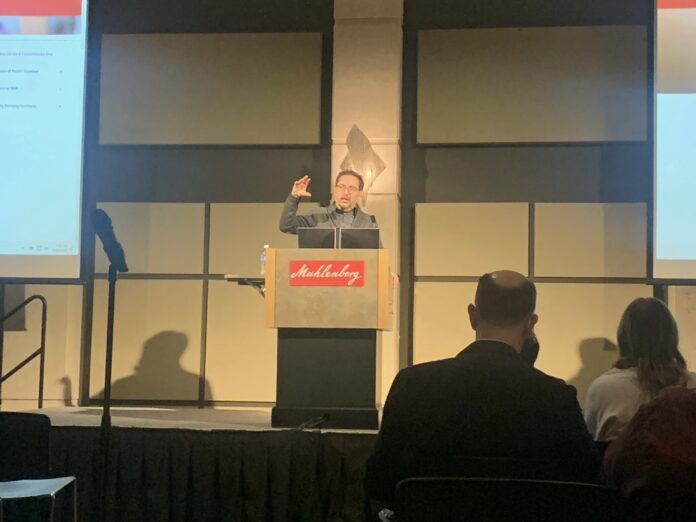
Conversations at Muhlenberg College surrounding the concept of a Latino vote continued this week on Sept. 30 with a lecture given by Historian and Northwestern Professor Geraldo Cadava, Ph.D., entitled “The Latino Vote in 2024 and Beyond.” This lecture was hosted as part of the Political Science Department’s Election Series and the Phi Beta Kappa Visiting Scholars Program.
Cadava’s interest in politics began at a young age, as he recalls sitting by the foot of his grandfather’s bed to argue over various political subjects while he “tried to watch his movies in peace.” He says, “I didn’t realize how formative [those conversations] would be for me, but I think I kind of became interested in the wider world of Latino conservatism just as a way of trying to understand my grandfather.”
Learning about his grandfather’s conservative views as well as how they were formed by his experiences in this country was fascinating to Cadava because he could not fully grasp the idea of conservatism ideals in Latino cultures, describing it as “a strange little mystery that I didn’t understand.” This became the guiding question to 10 years worth of Cadava’s research, which has only since expanded as subjects regarding the influence of Latinos in politics has become more prevalent over recent years. Cadava explains, “What started for me as a question of Latino history, culture and identity has slowly, over time, merged with a matter of national conversation, and that’s kind of been interesting for me just thinking about my career as an academic historian.”
The lecture began with a brief overview regarding the history of the Latino vote that Cadava studied throughout his years of research. Cadava started with his assertion that the concept of the Latino vote began in the mid 20th century, when the populations of states such as California, Texas, Arizona and Florida were increasing in population, and therefore, electoral value. Here, he distinguishes his definition of the Latino vote as direct outreach and mobilization of Latino voters within political campaigns rather than Latino involvement in politics, as Latinos were involved in politics way before this era.
However, many Latinos began to move into the suburbs of these states after World War II and were now more politically engaged given their service in the war and the increased number of Latinos attending college. For this reason, the Republican and Democratic parties began to campaign towards Latino voters, which can be seen in the campaigns of Eisenhower, Truman and Kennedy. Moving onto the 60s, Cadava explained how the Republican party was inclined to campaign towards Latinos after Republicans voted against The Civil Rights Act of 1964 in large numbers and lost support from African American voters. It was also during this time that the Republican National Hispanic Assembly was formed to encourage Latinos to run for office and to take a more systematic approach to campaigning towards Latino voters. This motivation continued in the 70s as Republicans tried to sell the idea that they were the party for Latinos with their ideals regarding anti-communism, family values and work ethic, and that the Democrats were the party for African Americans– pinning the two groups against each other for their own benefit.
Cadava explained how this became an increasingly formalized effort in the 80s and 90s as politicians and academics alike became more interested in the idea of “whether Latinos were naturally inclined toward one political party or another.” With this, Cadava mentioned how he always has a “knee-jerk” reaction to the word “natural,” with the belief as a historian that “we are not born a particular way” and that our thoughts, opinions and all aspects of self are shaped by our surroundings. Here, Cadava highlights a significant theme regarding the concept of the Latino vote as the political diversity among Latino voters brings into question the tendency of campaigners to lump them all into one voting group due to their identity.
This point was of particular significance to Henry Floquet ‘25, who said, “I think being reminded of how much the Latino population is variable and hard to predict just like any other demographic was important. It’s simple and feels like common sense that numerous identities can’t be conflated, but it’s also easy to forget.”
This transitioned neatly into Cadava’s final portion of the lecture in which he discussed the political issues most associated with the Latino vote, beginning with race and identity. In recent years, it has become common for political scientists to infer that Latinos see themselves as one panethnic group, partly due to their shared experiences with racial discrimination. This has been reflected in census polls since the 1980s that separates the question asking the population what race they identify with to the question that asks if they are from Hispanic, Latino or Spanish origin.
Cadava brought the idea of grouping all Latinos together further into question when considering how different the experiences of Afro-Latinos are and how that may affect their political beliefs. He explained, “I think that this idea that Latinos do feel a growing sense of shared ethnicity is really being challenged and in many ways strained by these obvious realities that we have many different racial identities.” This becomes difficult for Latino advocacy organizations that try to convince congressional representatives that all Latinos vote together in order to see their political values fulfilled within legislation.
Moving onto the subject of immigration and the border, Cadava emphasized how data gathering the beliefs of Latino voters are contested. While Republican polls made during the Trump years suggest that attitudes of Latinos towards immigration have geared more towards restrictive policies, polls created by Latino advocacy organizations with more fine-tuned questions suggested that they favored legal status for immigrants. Cadava expressed his belief that the debate regarding how much Latinos think about immigration in the scheme of other political topics comes from the reversal of approach between Trump and Bush. He says, “Having talked to a lot of Latino Republicans, they told me that they believe Bush was kowtowing to the democratic idea that the way to recruit Latino voters was by promising immigration reform, and Trump seems to have challenged that because he was only talking about security and deportation, and still, his Latino numbers increased.”
Cadava ended by discussing religion and challenging the assumption that Latinos are overwhelmingly Catholic. Instead, he emphasized the fact that Evangelical christians are the fastest growing religion among Latinos, especially among those who move from Latin America to the United States. Cadava demonstrates the political impact this could have with the statement, “When Latin American migrants who are Evangelical come to the United States, often their first point of connection in the United States is the Evangelical church…seeing an Evangelical church as a kind of space of community formation and social globalization.”
Cadava pointed out how these issues are often analyzed individually rather than in terms of how they are all connected and affect each other. His final assertion that “all of these issues intersect with other issues” encourages the public not to silo these issues as to further promote the rights and interests of Latinos in America.
Samantha Tempkin ‘25 is a theatre and media & communication double major and is thrilled to be joining the Weekly’s staff as an Assistant News Editor! She is also the co-president of KPC, Muhlenberg’s K-Pop club. When she is not writing for the paper, Sam loves singing, dancing, listening to music, seeing Broadway shows, watching Marvel movies, and hanging out with friends!





















